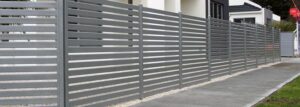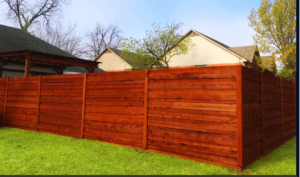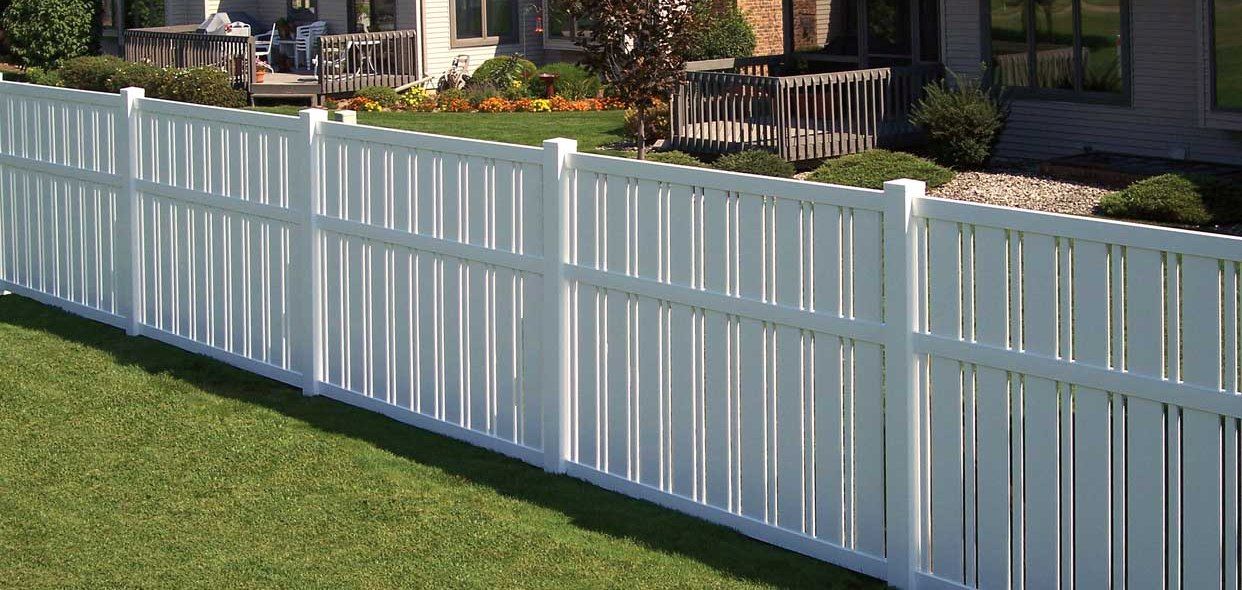When it comes to choosing the right fence for your home or business, aluminum and vinyl are two popular materials that offer durability, low maintenance, and an attractive appearance. Both have their advantages and disadvantages, and selecting the right one depends on your needs, preferences, and budget. Understanding the differences between aluminum and vinyl fences can help you make a more informed decision.
In this article, we’ll explore the key features, benefits, and considerations of aluminum and vinyl fences. Whether you’re looking to enhance your privacy, improve security, or boost the curb appeal of your property, this comparison will guide you in choosing the best fence material for your needs.
What Are Aluminum and Vinyl Fences?
Before diving into the pros and cons of each type of fence, let’s start by understanding what aluminum and vinyl fences are and how they differ.

Aluminum Fences
Aluminum fences are made from a lightweight, corrosion-resistant metal. They are known for their strength and ability to withstand harsh weather conditions without rusting or weakening. Aluminum fences often come in a variety of styles, from traditional picket designs to ornamental styles, and they can be customized with different heights, colors, and finishes.
Vinyl Fences
Vinyl fences are made from synthetic plastic material (PVC). They are known for their clean, sleek appearance and are available in a variety of colors, including white, tan, and more. Vinylfences are highly durable and resistant to fading, cracking, and warping, making them a long-lasting choice for homeowners. Like aluminum, vinyl fences also come in a range of styles, from privacy fences to decorative options.
Key Differences Between Aluminum and Vinyl Fences
While both aluminum and vinyl fences are low-maintenance and provide excellent security, they differ in several important ways, such as appearance, durability, installation, and cost. Let’s break down the key differences to help you decide which one suits your needs.
1. Appearance and Design Options
One of the first things you’ll notice when comparing aluminum vs. vinyl fences is their appearance. Both offer attractive looks, but each material has its own unique qualities.
- Aluminum Fences: Aluminum fences have a classic, sleek appearance with clean lines. They often have a more industrial or ornamental feel and are perfect for homeowners looking for a more traditional or decorative fence. Aluminum fences can be customized with various finishes and colors, but they tend to have a more open and airy design compared to vinyl fences.
- Vinyl Fences: Vinyl fences, on the other hand, provide a more contemporary and solid appearance. These fences often resemble wood but without the upkeep. Vinyl is available in a variety of colors and can mimic the look of wood grain, offering a more natural appearance. Additionally, vinyl fences are typically more opaque than aluminum fences, which can provide greater privacy if that is a priority for you.
2. Durability and Maintenance
Durability is an important factor to consider when choosing between aluminum and vinyl fences. Both materials are low-maintenance, but their resistance to wear and tear varies.
- Aluminum Fences: Aluminum fences are strong and resistant to rust, which makes them a great choice for properties in areas with high humidity or near coastal regions. Aluminum can last for many years without significant deterioration, but it may become scratched or dented if it comes into contact with heavy objects. To maintain an aluminum fence, you may need to occasionally clean it and touch up any scratches or paint chips.
- Vinyl Fences: Vinyl is one of the most durable materials available for fencing. It is resistant to fading, cracking, and warping, even when exposed to extreme weather conditions. Vinyl doesn’t need to be repainted, as it retains its color for many years. It is also resistant to pests like termites and can be cleaned easily with soap and water or a mild detergent.
3. Cost and Value
When deciding between aluminum and vinyl fences, cost is a major consideration. Both types of fences offer long-term value, but their initial costs can differ.
- Aluminum Fences: Aluminum fences are generally more affordable than vinyl, making them a good option for homeowners who want a durable fence without a high price tag. The cost of aluminum fencing can vary depending on the style, height, and customization options. While aluminum fences may require occasional maintenance, their lower upfront cost often makes them a budget-friendly choice.
- Vinyl Fences: Vinyl fences tend to be more expensive upfront than aluminum fences. However, since vinyl requires little to no maintenance and can last for decades without needing repairs, it can be a more cost-effective choice in the long run. While the initial investment may be higher, vinyl fences offer excellent value over time due to their durability and low-maintenance nature.

4. Security and Privacy
If security and privacy are top priorities for your fence, it’s essential to consider how each material performs in these areas.
- Aluminum Fences: Aluminum fences are typically used for decorative purposes or to provide a secure boundary around a property. However, due to their open design, they may not provide the level of privacy that some homeowners desire. While aluminum fences can be tall and are excellent for keeping pets and children inside the yard, they are less effective at blocking views compared to vinyl fences.
- Vinyl Fences: Vinyl fences are the clear winner when it comes to privacy. They offer a solid, opaque barrier that blocks views from the outside, making them ideal for homeowners who want to create a private space. Vinyl fences also provide a strong level of security because they are more difficult to climb compared to aluminum fences, providing added protection for your property.
5. Environmental Considerations
Both aluminum and vinyl fences have their environmental considerations, but their impact on the environment differs.
- Aluminum Fences: Aluminum is a recyclable material, which makes it a more environmentally friendly choice compared to other fencing options. Aluminum fences can be recycled at the end of their life cycle, reducing their overall environmental impact.
- Vinyl Fences: Vinyl fences are made from PVC, a plastic material that is not biodegradable. While vinyl is highly durable and long-lasting, it is not as eco-friendly as aluminum. Vinyl is harder to recycle and may contribute to environmental waste over time. However, some companies offer eco-friendly vinyl products made from recycled materials.
Conclusion: Which Fence Is Right for You?
Choosing between aluminum and vinyl fences ultimately depends on your priorities and the specific needs of your property. If you’re looking for an attractive, durable, and low-maintenance fence on a budget, aluminum might be the right choice for you. It offers a sleek, ornamental look and is highly resistant to rust and corrosion.
On the other hand, if privacy and low maintenance are your top concerns, vinyl may be the better option. Vinyl fences provide a solid barrier, blocking views and offering greater privacy. While they tend to be more expensive upfront, they require very little maintenance and can last for decades.
If you need assistance in selecting and installing the perfect fence for your home, contact JPM Home Services at (302) 598-6297. They offer professional fencing services in Delaware and surrounding areas, including Middletown, Maryland, New Jersey, and Pennsylvania.
FAQs
Q: How long do aluminum and vinyl fences last?
Both aluminum and vinyl fences are long-lasting. Aluminum fences can last 20 to 30 years with proper maintenance, while vinyl fences can last 25 to 40 years without the need for frequent repairs or painting.
Q: Can vinyl fences be repaired if damaged?
Yes, vinyl fences can be repaired, but the process may involve replacing a damaged section. Since vinyl is not easily paintable, repairs may require matching the original color and texture.
Q: Are aluminum fences good for security?
Yes, aluminum fences are excellent for securing a property, especially when they are tall and designed with closely spaced pickets. However, they are less effective at providing privacy compared to vinyl fences.
